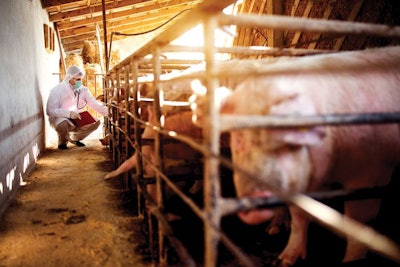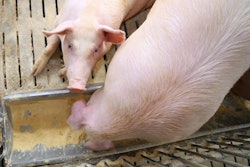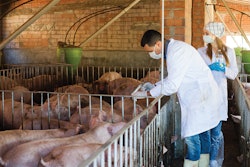
Latest outbreaks of African swine fever in pigs in the Philippines are attributed to illegally traded pig meat, say officials.
Officials in the Davao Region of the Philippines have warned hog owners to maintain high biosecurity around their animals. Among the key pieces of advice was for farmers to leave equipment and clothing used at the farm, instead of taking any items home.
This warning was issued after new cases of African swine fever (ASF) were identified in pigs in Tagum City, Santo Tomas municipality, and the town of Carmen, reported the Philippine News Agency (PNA) last week.
According to a local official, the latest outbreaks have been contained. About 240 pigs have been culled in the area. Others reported that preventative measures and intensified monitoring have been put in place. There are checkpoints at a number of key areas in the province of Davao del Norte.
Located in the south-east of the island of Mindanao, Davao Region was the location of several previous ASF outbreaks.
Latest figures from the World Organisation for Animal Health (OIE) put the number of outbreaks in the Philippines since July 2019 at 451, including 303 that are still ongoing. More than 342,000 pigs in the region have been directly affected by the disease.
Illegal pork trade blamed for Philippines’ outbreaks
Source of infection in the latest outbreaks has not been identified. However, Agriculture Secretary William Dar has indicated this is likely smuggled pork, reports Business World.
The country’s first meat inspection facility is planned for the Port of Manila, he said. However, construction has been delayed by “various legal and logistical barriers,” according to the head of the Bureau of Animal Industry. In the meantime, internal border controls are being further strengthened.
According to Dar, bans are imposed on imports of pig meat from any country that reports ASF. Furthermore, all meat entering the country is subject to a two-stage inspection process. These are carried out first at the port of entry, and again at the cold storage facility.
Further cases in Russia’s Far East
Two of the latest ASF outbreaks officially registered by Russia’s agriculture ministry were in backyard herds in the Far Eastern federal district.
A total of 18 pigs were involved in these outbreaks in the same district of Primorsky krai. While 10 of the animals died, the fate of the others is not recorded.
In addition, three wild boar in the same district have tested positive for the ASF virus, as well as one in Khabarovsk krai.
In this federal district, there have been 178 confirmed outbreaks of ASF since the disease first emerged in the region in July 2019. According to the OIE, four of these outbreaks are ongoing. As of October 29, 4,780 pigs have been lost through mortality or culling.
South Africa records new cases
With confirmation of new cases in Gauteng, South Africa’s total ASF outbreaks since April 2019 has risen to 24. So far, all have been outside the country’s ASF Control Zone.
Latest to be affected was a farm with approximately 500 pigs in Randfontein, according to the agriculture department’s latest report to the OIE. Of these, 313 of the animals died. The fate of the rest of the herd has not been reported.
Up until the latest outbreak was confirmed at the end of October, there had been no cases in the region since July, when the disease hit another farm in Gauteng. Majority of the previous outbreaks were in village herds.
Nigerian cooperative struggles to recover from ASF
Owners of animals at the Oke-Aro cooperative farm are calling on Lagos state and national governments for support.
According to Naija 247 News, more than 230,000 pigs at the farm — or approximately 90% — died as a result of ASF. The situation there was exacerbated by the coronavirus (COVID-19) pandemic. Under the associated national lockdown, owners were unable to take care of their animals, or to separate apparently sick and healthy pigs.
For some owners, only a handful of their 500 animals have survived. The president of the farm is calling on the governments to issue grants to the 3,000 farmers affected. These would allow the owners to restock, and to resume their businesses.
The last official report to the OIE from Nigeria on the ASF situation there was two months ago. According to the agriculture ministry at that time, the disease had been detected in 12 states. The peak period for new outbreaks was in May and June, but the number of animals affected was not reported.
View our continuing coverage of the global African swine fever situation.

















